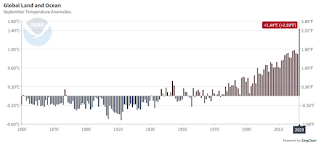Record Global Temperatures in September 2023: Are We Approaching a Climate Milestone?
In September 2023, scientists were left astounded as the global temperature reached unprecedented heights, breaking records and raising concerns about climate change. This article dives into the remarkable findings and their implications.
"Breaking Records: September 2023's Shocking Global Temperature Surge"
In a climate reality that's leaving experts startled, September 2023 witnessed a jaw-dropping spike in global temperatures. As we delve into the startling findings, it's essential to grasp the urgency of the situation and understand what's at stake for our planet.
The global scientific community is in a state of shock as they release the findings that September 2023 has set a new, alarming standard for heat. The records show an unprecedented surge in global temperatures that could push us past a critical climate threshold. Let's explore this climate anomaly and its potential consequences.
Key Highlights:
Unprecedented Heat: According to Europe's Copernicus Climate Change Service and the World Meteorological Organization, September 2023 was unequivocally the hottest September ever recorded. It surpassed the previous record from September 2020 by a staggering 0.5°C and stood at approximately 1.75°C higher than pre-industrial levels.
Scientific Astonishment: Berkeley Earth scientist Zeke Hausfather aptly described the situation as "absolutely gobsmackingly bananas." This sentiment was echoed by NASA, NOAA, and Berkeley Earth, all of which confirmed the record-breaking heat.
Record Streak: September 2023 marked the fourth consecutive month of record-warm global temperatures. NOAA Chief Scientist Dr. Sarah Kapnick emphasized that not only was it the warmest September ever but also the most atypically warm month in NOAA's 174 years of climate records.
El Niño Influence: In 2015 and 2016, the strong El Niño event caused record-breaking temperatures. Currently, a new El Niño pattern is developing, raising concerns about the potential for further temperature increases.
Exceeding 1.5°C: Both NOAA and Berkeley Earth warn that there's a greater than 99% chance of 2023 becoming the hottest year on record. Moreover, they suggest a 90% chance of surpassing the critical 1.5°C temperature threshold established by the 2015 Paris Agreement, a significant shift from earlier predictions.
Conclusion: Until recently, it seemed that we were still a significant time away from breaching the 1.5°C limit set by the Paris Agreement. However, the unexpected surge in global temperatures has brought this milestone much closer. The implications of this sudden change are profound, and it's a stark reminder that we must take immediate and effective action to mitigate the effects of climate change.
This article serves as a wake-up call, urging individuals and governments to address climate change with renewed urgency. The time to act is now, as we stand on the precipice of a climate crisis that could reshape the world as we know it.
#ClimateChange, #GlobalWarming, #ClimateCrisis, #EnvironmentalImpact, #ClimateAction, #RecordTemperatures, #ClimateMilestone, #September2023, #ParisAgreement, #ElNinoImpact, #EnvironmentalAwareness, #ClimateEmergency


